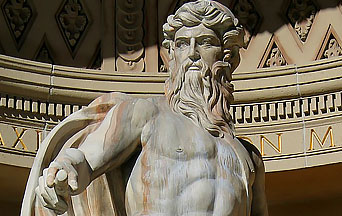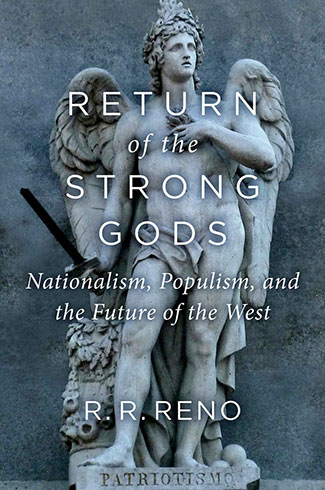
The cultural devastation around us leads many to ask where we went wrong. Most realize it did not happen overnight. A long process has brought us to ruin.
R. Reno’s book, Return of the Strong Gods: Nationalism, Populism, and the Future of the West, is an accurate, even refreshing critique of the post-war consensus that dominated the nation. He explains how a modern world imbued with certainties became a postmodern culture that abhors definitions. The work might well be called how we became postmodern.
The editor of First Things claims the postwar consensus arose as a reaction to the strong ideologies of modernity. Our rightful rejection of oppressive ideologies like communism and Nazism, he claims, led to a rejection of all strongly-formulated ideas, even good ones. Thus, we have thrown the strong-willed baby out with the bathwater. We have deconstructed the strong structures all societies need to sustain themselves.
The Descent Into Fuzziness
As a result, the author continues, all that was defined faded into fuzziness. Our society denied Truth because it “has fixed and strong connotations.” We adopted “meaning” because it is “personalized, mobile and weak.” The postwar consensus emptied everything of its metaphysical substance, installing what Gianni Vattimo called the “weakening of Being.”
10 Razones Por las Cuales el “Matrimonio” Homosexual es Dañino y tiene que Ser Desaprobado
The worst consequence of this new mentality was a regime of self-contained littleness. The consensus asked us to have “no large truths, no common loves, and no commanding loyalties.” We were asked to “renounce our desire for great things and transcendent visas” and seek instead vapid “little worlds” centered on all that is ordinary and individual. This small vision was also reflected in the postwar Hayekian understanding of the economy based on globalized systems of atomized self-interest.
This gentle postmodern world engendered a cruel monster, he claims. Its “paradoxically totalitarian culture of openness and weakening” brought us to a state of moral decay and social disintegration. It imposed its diktats of political correctness upon us. People want out.
Demanding the Return of the Strong Gods
The author’s analysis of how we became postmodern is right on target. This exaltation of openness and weakening has gone awry. Populism beckons us to reject the post-war consensus that made us postmodern. Nationalism airs its siren song. People clamor for a return of the strong gods.
Dr. Reno is not advocating an authoritarian regime. He only asks that Americans start believing in the nation again. “The strong gods are the objects of men’s love and devotion, the sources of the passions and loyalties that unite societies.” They can be traditional, timeless and beneficent. The gods might embody home, marriage, faith, sovereignty and self-government.
Can They Save Us?
We can call upon the strong gods, yet it is not certain that they will save us.
 Learn All About the Prophecies of Our Lady of Good Success About Our Times
Learn All About the Prophecies of Our Lady of Good Success About Our Times
Many bad ideas litter the cultural landscape. The author curiously does not see our present plight as a philosophical problem. It is not “a crisis of modernity, liberalism or the West.” Thus, he leaves intact many of the liberal, modern and Enlightenment errors that have wrought havoc on the West. Likewise, he does not see Biblical religion as a central factor in the definitive solution. It may retain some influence, but “it cannot resume its old place in society.”
Dr. Reno believes that all past errors can be superseded by the recovery of a sense of what he calls the “we” by which people come together by “renewing shared loves and unifying loyalties.” Such a possibility involves a temperamental return to solidarity with others. After the pendular shift toward weakness, the author insinuates it is only a matter of finding good leaders who can respond to populist desires. Everything can then shift back to sanity once strong ties are vindicated.
Here enter the problems with the book’s thesis. Society has changed dramatically over the last decades. We no longer have the social structures of marriage and community to frame this appeal. Individuals have taken their fantasies of freedom to unimaginable depths of self-identity and delusion.
Indeed, it is hard for soft people to call back strong gods. By adopting a “small world” vision, so many have turned into selfish little gods unwilling to be dethroned.
Eternal and Natural Law: The Foundation of Morals and Law
Given this decadence and selfishness, there is no guarantee that people will rise above self-interest to desire the strong gods. Even if some do unite around the “we,” a constellation of shared loves inside the old liberal framework will not unify the nation. Naturally speaking, a pantheon of “shared loves” will not solve our crisis no matter how strongly formulated.
The Need for a Stronger God
The eternal problem with pantheons is that they tend to proliferate their membership and pander to the passions of men. They enshrine vices together with virtues. Frightening abuses slip in despite efforts to prevent them.
What is needed is the return of the One True God, who historically has overturned pantheons and selfish little gods. However, He is a jealous God who will have none other before Him. He calls us back to Him alone.
Christian civilization inspired “shared loves and unifying loyalties.” Christians then desired “great things and transcendent vistas.” What brought about these things was the love of God and the work of His Grace in souls united in Christian charity. Thus, everyone could overcome the love of self, think in terms of the common good and practice virtue in common.
Science Confirms: Angels Took the House of Our Lady of Nazareth to Loreto
Wherever the Church has acted, it has followed this program. Indeed, a splendorous Christendom turned toward the Crucified Christ was built over the ruins of the Roman Empire and its pantheon of strong gods.

